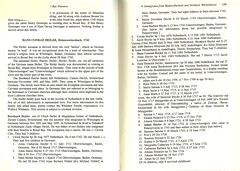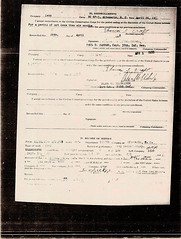Today, thanks to technology such as radio, television, the internet, cell phones and more, we witness history every day. We instantly know about a new discovery or advancement, a tragic event or one to be celebrated. But in the past the only witnesses to such an event were the people who were actually there. Everyone else would have to wait days, weeks or
 even months to learn what had happened. Looking back through the family tree, everyone can find someone who was witness to some historical event or movement. In my family tree it's my Great-Great-Great Grandfather, William A Craft, who was in Appomattox, Virginia for surrender of the Confederate Army and the end of the Civil War.
even months to learn what had happened. Looking back through the family tree, everyone can find someone who was witness to some historical event or movement. In my family tree it's my Great-Great-Great Grandfather, William A Craft, who was in Appomattox, Virginia for surrender of the Confederate Army and the end of the Civil War.William joined the Confederate Army in Elbert County, Georgia as a private in the 15th Georgia Infantry Regiment, Company C. He was joined by his brothers, John F and Willis M Craft. According to the National Park Services Civil War Soldier and Sailor System, the 15th was part of the Patomic District and later was part of Benning's Brigade with the Army of Northern Virginia. This regiment fought in battles such as Chickamauga, Knoxville, Petersburg, Gettysburg and Manassus. According to a short news piece published in the Augusta Chronicle in 1938, William picked up a bible off the battle field at Malvern Hill (Henrico County, VA). The bible has been passed down through the family for generations as a family heirloom (not my line, unfortunately).
Many families have multiple ancestors who fought in the Civil War, but what stands out about William is how he ended the war. Not only did he make it home after the surrender - but he was at the surrender. Now, I highly doubt that a lowly private was actually anywhere near the big-wig generals or the actual surrender, but he was in Appomattox, Virginia as part of the Army of Northern Virginia. He was among the first to learn of the end of the war. He would have received rations from the union army. He would have received a parole that allowed him to return home to his family. He might have been the first to tell others of the end of the war. William was a witness to history.











